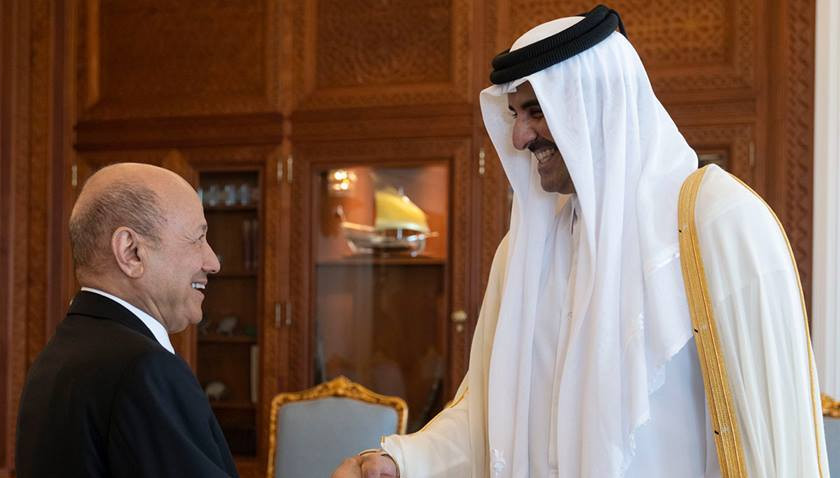The war has turned Yemen into the world’s worst humanitarian crisis, where more than 14 million people, 80% of the population, are in acute need of humanitarian assistance.
Qatar’s Amir Sheikh Tamim bin Hamad Al Thani met with Yemen’s newly-appointed Chairman of the Presidential Leadership Council Rashad Muhammad Al Alimi in Doha on Thursday.
According to Qatar’s News Agency (QNA), Sheikh Tamim and Al Alimi discussed the latest developments in Yemen along with issues of common concern.
Speaking to Doha News, analysts believe that the Yemeni official carries “an entangled web of challenges” that comes with his new appointment.
“In the short term, Alimi is coordinating with the international community to sustain the fragile truce with the Ansar Allah (Houthi) bloc, while addressing the Command-and-Control challenges of integrating fragmented anti-Houthi forces under a unified chain of command,” Mohammed Basha, Communications and Client Engagement Manager at Navanti Group told Doha News.
Al Alimi came to office in April after Yemen’s President Abedrabbo Mansour Hadi transferred powers to a presidential leadership council in a move that dismissed his deputy, Ali Mohsen Al-Ahmar. Hadi is currently exiled in Saudi Arabia after being forced out of Sanaa in late 2014 by the Houthi rebels.
“Alimi’s government coffers are empty, and he needs to secure finances to pay salaries, support service provisions, and most importantly fend off a catastrophic famine in Yemen as a result of the unprecedented disruption to global grain supplies due to Russia’s invasion of Ukraine,” added Basha.
The power transfer came amid a two-month ceasefire, which was extended this month, following talks in the GCC’s Riyadh headquarters to reach a political resolution to more the seven-years of war.
The Houthis had refused to participate in the talks as they were hosted in a rival country. Qatar has long called for a political solution in Yemen. Last year, the Houthi rebels expressed their willingness to partake in talks in Doha.
“Doha can play a future role in hosting peace talks or mediating between warring parties, and support post-war reconstruction efforts,” said Basha.
Since 2014, Yemen has been a battleground between Iran-backed Houthi rebels and the Saudi-led coalition, which supports the internationally-recognised Hadi government.
The war started erupted the rebels seized most of Sanaa before capturing the Red Sea port city of Al-Hudaydah, forcing Hadi to escape to Aden where he declared the militants’ takeover as a “coup”.
Saudi Arabia has welcomed Hadi’s decision to step down and announced $3 billion in financial aid to Yemen, as the kingdom’s news agency (SPA) reported. Out of the total amount, $2 billion will be provided by both Saudi Arabia and the UAE to support the Yemeni Central Bank.
The remaining amount is divided into $600 million from Saudi Arabia to enable the purchase of oil derivatives and $400 million to support development projects and initiatives. A total of $300 million will go towards funding the UN’s humanitarian response plan.
The war has turned Yemen into the world’s worst humanitarian crisis, where more than 14 million people, 80% of the population, are in acute need of humanitarian assistance.
The war has also displaced more than three million people.







